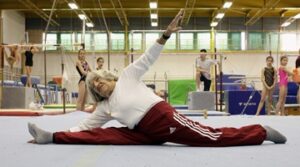
Editor’s Note: Agnes “Agi” Keleti died on Thursday in her native Budapest at age 103. We are reposting this rememberance of Agi as told to our writer Brian Kluepfel by her cousin Michael Gyory.
Agi Keleti won 10 Olympic medals, surviving Nazis and Communists
In 1973, 17-year-old Michael Gyory saved his D’Agostino’s bagging money and went to Israel to visit his cousin Agnes “Agi” Keleti. A joint swim in the Mediterranean left him gasping on a sandbar far from shore as Agi — three times his age — relaxed comfortably, teaching him something about her stamina and grit.
“I was overwhelmed with the prowess of this woman,” said Gyory. “It made me start to think about what she did — it took more than physical strength.”
Born in Budapest in1921, Agi Klein was a national gymnastics champion by age 16, yet she couldn’t work most jobs or take part in a competition against fascist Italy; they didn’t allow Jews. When Poles started streaming into Hungary a few years later with horror stories of the Nazi occupation, Agi, with first-hand knowledge of the cruelty of antisemitism, didn’t doubt their tales.
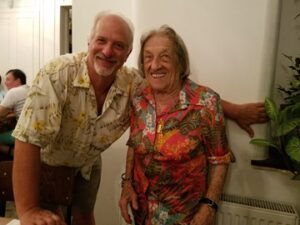
During her potentially peak athletic years, Budapest’s Jews were reduced to survival mode. In 1944, the full ferocity of the Nazi killing machine was unleashed: 70% of all the country’s Jews were killed in less than a year, more than 500,000 in all. Hungarian Jews accounted for one-third of Auschwitz’s death toll; 38,000 Jews were killed in Budapest itself, many lined up along the banks of the Danube and shot.
Tomi, Michael Gyory’s dad and Agi’s first cousin, was “a real wheeler-dealer,” says his son, and was able to secure false paperwork so that Agi could still work — ironically, in a Romanian munitions factory, making weapons for the Germans.
Playing the role of “Juhasz Piroska” a Christian housekeeper to a virulent antisemite, among Agi’s unenviable tasks was picking up the bodies of dead Jews which lay too close to the house.
Twenty-three when the war ended, Agi practiced in a windowless, unheated gym with an old training partner, wearing gloves and taking turns stoking a coal stove. Her success was immediate, winning the Hungarian championships in 1946 and the Central European title in 1947.
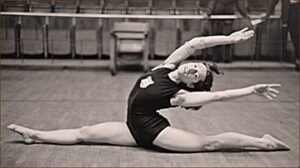
Preparing for the 1948 London Olympics, bad luck befell her: She ruptured an Achille’s heel weeks beforehand. Hungary finished second in team gymnastics: Agi says they would’ve been first with her.
Undaunted, Agi won four medals at the 1952 Helsinki Games at age 31, followed by three at the 1954 World Championships in Rome (Jews could now participate in Italy, after all). She capped her career by winning four gold and two silver medals at the Melbourne Olympics.
YouTube footage shows her in Helsinki and Melbourne at her best events, the floor exercises and balance beam. She doesn’t look very different than 21st century competitors: so agile and sharp was she, one month shy of 36, that she missed the all-around gold by a mere three one-hundredths of a point.
Like many fellow Hungarian athletes, Agi chose to stay in Australia, as the exodus from under the Iron Curtain began in earnest: Russian tanks had rolled over Budapest mere weeks before the games.
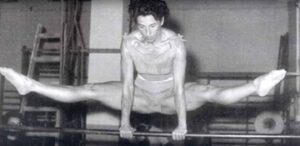
Moving to Israel in 1957 she married a fellow Hungarian, Robert Biro and had two sons; she dubbed giving birth at age 41 and 43 “her last gold medals.”
She coached gymnastics in Israel for several years but at last retired to her native Budapest in 2015, lured by perhaps nostalgia, but also, jokes Gyory, “by a slightly better pension!” At 103 she is the oldest living Olympian; for the 2021 games, at age 100 she was featured in an ad with the youngest Olympian, 13-year-old Sky Brown of Great Britain.
Gyory says that his famous cousin’s story remains a point of family pride, and also provides a wider lesson. Speaking of Holocaust survivors, he says, “It’s refreshing to me to see somebody who comes through this as a winner and with a positive outlook on life.”
Michael Gyory lives in Irvington and is chairperson of the Holocaust and Human Rights Education Center in White Plains. Among the educational presentations he gives is one on his famous cousin, Olympian and survivor Agi Keleti.


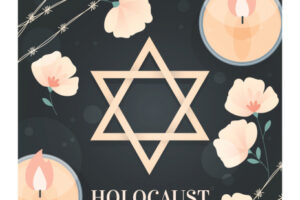


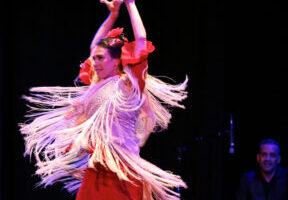

I love this, what a great and inspirational story and person!
Wow – what an inspiring story. God bless her!
Great reading – truly inspirational story. I think Shirley would love to see this. You make me proud!
Thanks so much for taking the time to read the article. It is indeed an inspiring and amazing tale.
What an incredible journey! Thanks for sharing this story. All the best from Martha and Michael Witkowski (Carrollwood)
Amazing story!